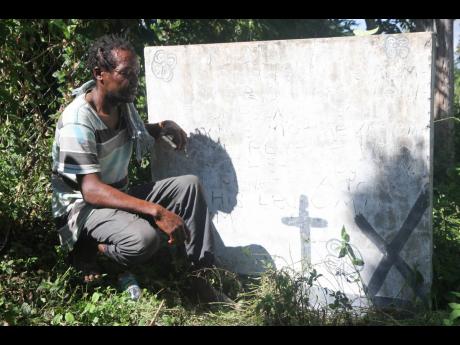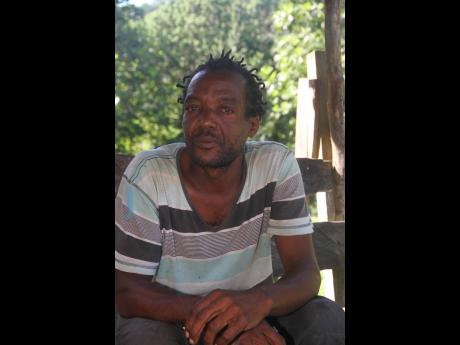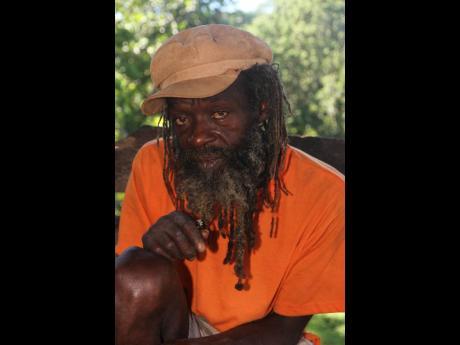Trauma, trembling haunt Kraal survivors
His heart heaving with fear, Rohan Thomas has vivid recollections of bolting through bushes at lightning speed, each stride faster and longer as if chased by a ghost. It was his own ghost that he was fleeing to escape.
A survivor of the quadruple killing in Kraal, north-central Clarendon, Thomas is still wracked by the trauma linked to the bloodletting that unfolded on May 7, 2003, a flashpoint that regained international prominence last Thursday when the Trump administration slapped six current and former Jamaican policemen with travel and other sanctions.
Washington’s ban against Reneto Adams, Devon Orlando Bernard, Patrick Anthony Coke, Shayne St Aubyn Lyons, Leford Gordon, and Roderick Anthony Collier resurrected bitter memories for the residents of the rural district. They still claim that the Crime Management Unit, the feared police squad led by Adams, killed the Kraal quartet in cold blood even though they were acquitted in a high-profile case in December 2005.
Thomas said he perpetually mourns the dead.
“Mi tink about mi friend and di whole a dem weh gone, man. Every day mi talk bout dem,” he told The Gleaner as other residents who sat on the makeshift porch of a shop in Kraal nodded in agreement.
Thomas expressed anger at what he deemed was the innocent killing of Angella Richards, 45; Ferris Lewena Thompson, 38; Matthew James; and a man known only as ‘Renegade’.
He recalls two men conducting surveillance in the community earlier that fateful day and enquiring about the whereabouts of some of the men who were targeted. The spotters were outsiders, said Thomas.
He paints the tragedy that took place as an ambush.
“As him come offa him bike and uppa him yaad siddung, there comes the police dem, and dem nuh come and say, ‘[Police!’] From dem come out, a suh dem stay - pure gunshot,” Thomas said, harking back to the explosive, ear-splitting violence that rocked the quiet district.
Thomas said that in his bid to escape, his face, hands, and feet “mash up”.
Adams and his colleagues, however, offered a vastly different narrative of a defensive reaction in a shoot-out to which they were forced to respond.
The police claimed that two illegal firearms – a Taurus 9mm pistol with six cartridges and a Winchester rifle with 14 rounds – were seized. The CMU was later disbanded.
Thomas’ relative, Khadane Rowe, may have been too young to remember the details of that day, but he said the sight of Thomas after he surfaced from the bushes has scarred his memory forever.
“I am still traumatised by it … . And it left the impression that I can be sitting right here and the police can come back and do the same thing,” he said, sombrely.
Adams, who retired from the Jamaica Constabulary Force in 2008, has chafed at the State Department’s designation of him and the other five men as being guilty of gross violations. He calls Washington “the Great Satan”, lambasting the Trump administration for baseless allegations and seeking to undermine the decision of a sovereign Jamaican court.
Secretary of State Mike Pompeo said that America’s actions “underscore our support for human rights and our commitment to promoting accountability for perpetrators of human-rights violations in Jamaica and around the world”.
The sanctions fall under the Magnitsky Act and bans the six men and their families from travelling to the US. Any assets held in the US will also be frozen.
Verol Smith, a Rastafarian resident of Kraal, said the 2003 bloodbath also had traumatic consequences for another escapee.
Now deceased, Jah T had left the death house just moments before the police descended on the community. Jah T, Smith said, was never the same after the shooting.
“Him keep speaking about it, and him old lady was a very sick lady at the time, and how police come make noise wid loud machine guns and dem tings deh,” said Smith.
“So him madda get traumatised and scared and a tremble fi days.”
Jah T died about two months ago.
The Kraal death house is now occupied by Marlene Spencer – niece of the owner who rented it to one of the victims.
Although she wasn’t in the community on May 7, 2003, Spencer said that her uncle was upset that he did not receive state compensation for the damage to the home. He was also peeved at the police’s claim that a gun was found in his room.
“That is definitely not true. They (police) kicked down the door and went in there because my uncle locked up that section of the house after he rented it out,” Spencer said.



